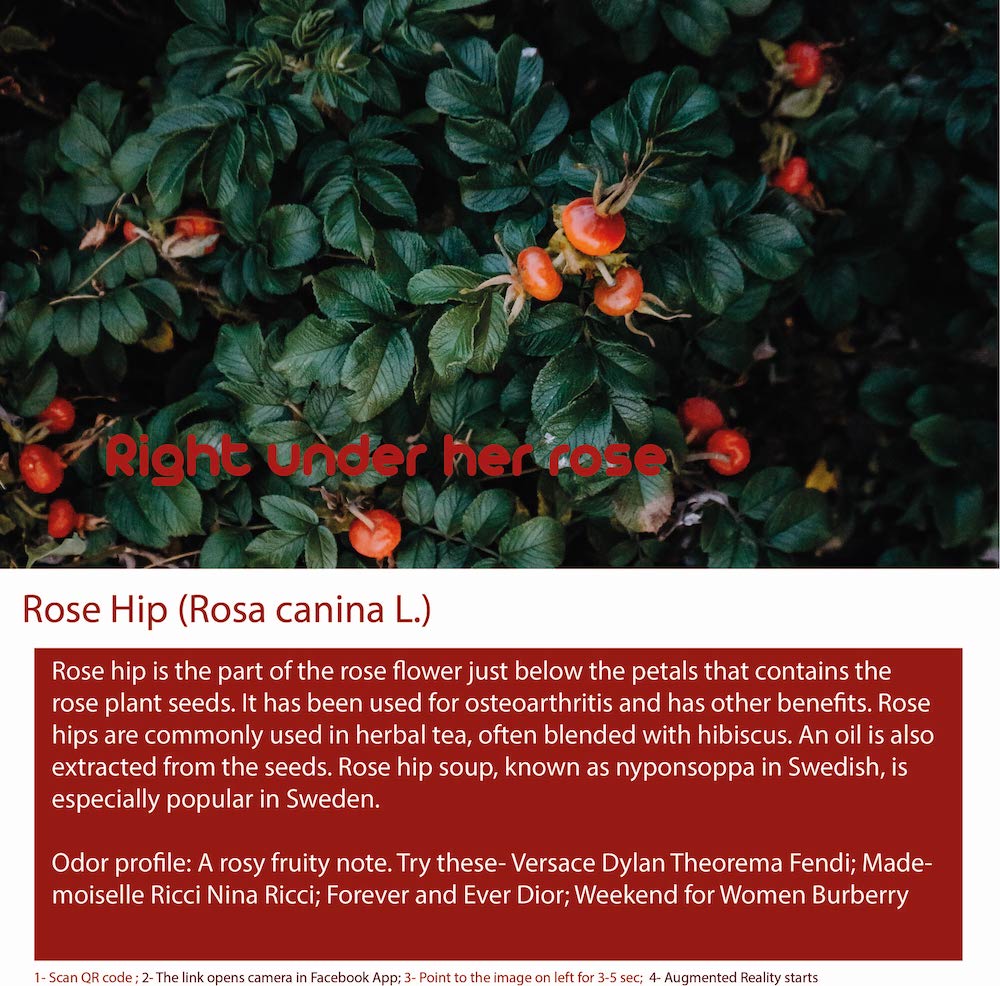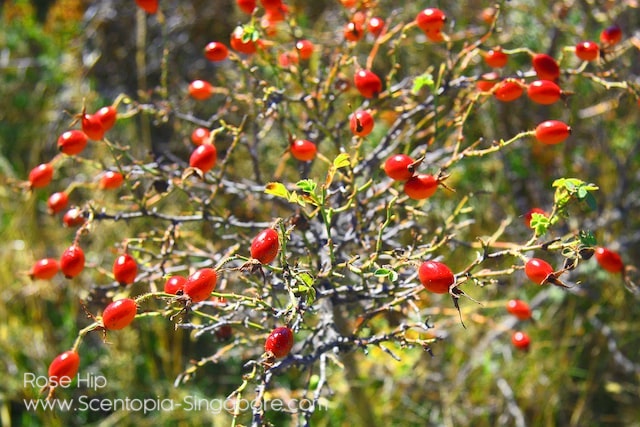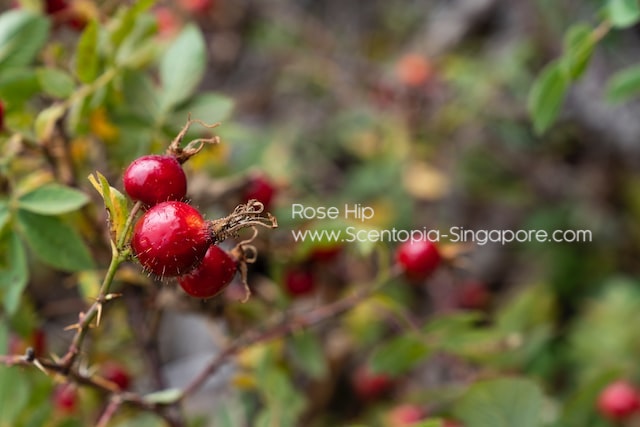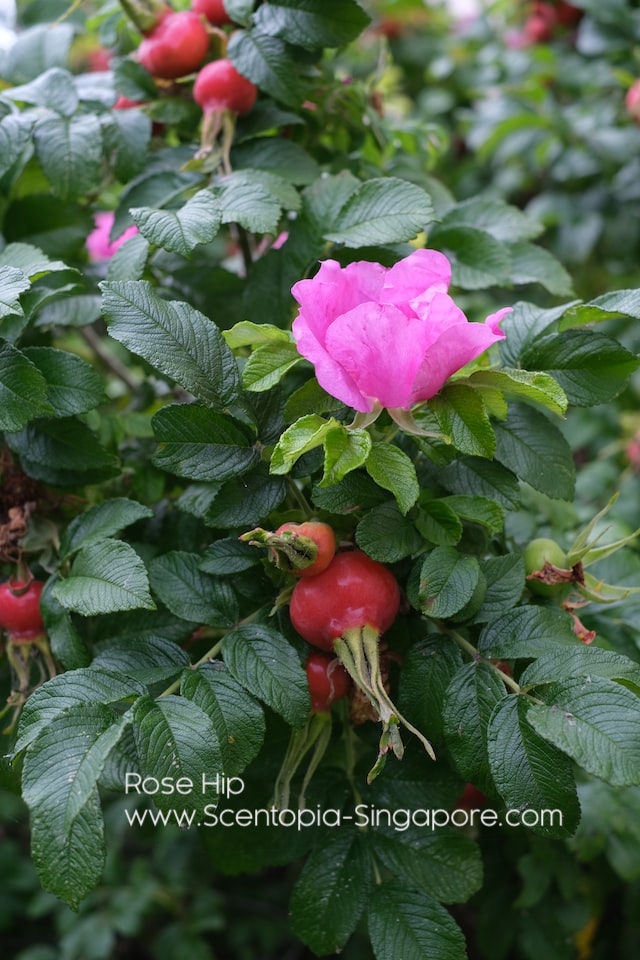Crafted with Care: Rose Hip Fragrance
Rose Hip: The Enigmatic Fruit of Perfumes, Healing, and Culinary Delights
Introduction: Rose hip, with its vibrant red hue and unique flavor, is an enigmatic fruit celebrated for its potential therapeutic properties, culinary uses, and presence in perfumes. Scientifically known as Rosa canina, this fruit is the seed pod of the wild rose plant and has been cherished by various cultures for centuries. From inspiring perfumers with its subtle fragrance to offering potential benefits in therapeutic oils and culinary creations, rose hip is more than just a fruit. This essay delves into the captivating world of rose hip, encompassing its presence in perfumes, therapeutic oils, food, medicinal systems, historical significance, and intriguing fun facts about this extraordinary and cherished fruit.
The Enchantment of Rose Hip: Rose hip fruits are renowned for their bright red color and rich nutritional content, making them popular choices in herbal remedies, culinary recipes, and perfumery.
Perfumes and Fragrance: While rose hip is not commonly used in perfumery to extract essential oils, its subtle and earthy fragrance has inspired perfumers to create scents that capture the essence of this intriguing fruit. Rose hip-inspired perfumes often evoke feelings of natural beauty, purity, and tranquility.
Therapeutic Oils and Aromatherapy: Rose hip essential oil is not widely available, but certain therapeutic oils with similar characteristics, such as rose essential oil or geranium essential oil, may be used in aromatherapy to promote relaxation, reduce stress, and soothe the mind.
Medicinal Applications: Rose hip is a rich source of vitamin C, antioxidants, and other beneficial compounds, making it valuable for supporting the immune system and promoting overall well-being. It has been used in traditional medicine systems to treat various ailments, including colds, digestive issues, and skin conditions.
Culinary Delights: Rose hip fruits are used in various culinary creations. They are often dried and brewed into herbal teas or used to make jams, jellies, and syrups. Their tart flavor adds a delightful touch to a range of recipes.
Historical Significance: Rose hip has a long history of use in various cultures. During World War II, rose hip syrup was given to children in Britain as a source of vitamin C when citrus fruits were scarce.
Fun and Crazy Facts:
Rose hip, with its vibrant color and potential wellness benefits, is an enigmatic fruit that continues to captivate and inspire with its earthy allure. From its presence in herbal remedies to its potential uses in aromatherapy and culinary creations, rose hip offers a wealth of enjoyment and potential health benefits. As we savor the tart flavor and subtle fragrance of rose hip and explore its historical significance, we are reminded of the enduring allure and timeless charm of this extraordinary fruit that has enriched our herbal traditions, culinary delights, and perfumery with its unique beauty and enchanting presence.
Introduction: Rose hip, with its vibrant red hue and unique flavor, is an enigmatic fruit celebrated for its potential therapeutic properties, culinary uses, and presence in perfumes. Scientifically known as Rosa canina, this fruit is the seed pod of the wild rose plant and has been cherished by various cultures for centuries. From inspiring perfumers with its subtle fragrance to offering potential benefits in therapeutic oils and culinary creations, rose hip is more than just a fruit. This essay delves into the captivating world of rose hip, encompassing its presence in perfumes, therapeutic oils, food, medicinal systems, historical significance, and intriguing fun facts about this extraordinary and cherished fruit.
The Enchantment of Rose Hip: Rose hip fruits are renowned for their bright red color and rich nutritional content, making them popular choices in herbal remedies, culinary recipes, and perfumery.
Perfumes and Fragrance: While rose hip is not commonly used in perfumery to extract essential oils, its subtle and earthy fragrance has inspired perfumers to create scents that capture the essence of this intriguing fruit. Rose hip-inspired perfumes often evoke feelings of natural beauty, purity, and tranquility.
Therapeutic Oils and Aromatherapy: Rose hip essential oil is not widely available, but certain therapeutic oils with similar characteristics, such as rose essential oil or geranium essential oil, may be used in aromatherapy to promote relaxation, reduce stress, and soothe the mind.
Medicinal Applications: Rose hip is a rich source of vitamin C, antioxidants, and other beneficial compounds, making it valuable for supporting the immune system and promoting overall well-being. It has been used in traditional medicine systems to treat various ailments, including colds, digestive issues, and skin conditions.
Culinary Delights: Rose hip fruits are used in various culinary creations. They are often dried and brewed into herbal teas or used to make jams, jellies, and syrups. Their tart flavor adds a delightful touch to a range of recipes.
Historical Significance: Rose hip has a long history of use in various cultures. During World War II, rose hip syrup was given to children in Britain as a source of vitamin C when citrus fruits were scarce.
Fun and Crazy Facts:
- Rose Hip Biodiversity: There are over 100 species of wild roses, each producing a unique variety of rose hip with different flavors and nutritional profiles.
- Ancient Medicinal Uses: Rose hip has been used in traditional medicine by indigenous cultures for centuries. For example, Native Americans used it to treat arthritis and gastrointestinal issues.
- Rose Hip in Cosmetics: Rose hip oil is used in skincare products for its potential anti-aging and skin-nourishing properties.
- Rose Hip in Folklore: In some folklore, rose hip is associated with love and protection and was believed to bring good luck and ward off evil spirits.
- Rose Hip Seed Dispersal: Birds and animals play a crucial role in dispersing rose hip seeds, helping the wild rose plant to spread and thrive.
Rose hip, with its vibrant color and potential wellness benefits, is an enigmatic fruit that continues to captivate and inspire with its earthy allure. From its presence in herbal remedies to its potential uses in aromatherapy and culinary creations, rose hip offers a wealth of enjoyment and potential health benefits. As we savor the tart flavor and subtle fragrance of rose hip and explore its historical significance, we are reminded of the enduring allure and timeless charm of this extraordinary fruit that has enriched our herbal traditions, culinary delights, and perfumery with its unique beauty and enchanting presence.
To experience augmented reality, please open the Facebook-app using QR code and point to the image below
Unveiling Nature's Aroma: Fresh Herbal Scent
Rose hip is the round fruit of a rose plant, typically red or orange, that is high in vitamin C and other antioxidants. It's commonly used in herbal teas, syrups, and supplements.
Rose hip tea is believed to have several health benefits, including:
Rose hip tea is believed to have several health benefits, including:
- Rich in Vitamin C: A natural source of Vitamin C, which supports immune system health.
- Anti-inflammatory: Contains antioxidants and anti-inflammatory compounds that may help reduce inflammation in the body.
- Supports joint health: May help relieve joint pain and stiffness due to its anti-inflammatory properties.
- Antioxidant: May help protect against oxidative stress and cellular damage.
- Supports digestive health: May help relieve symptoms of digestive issues such as constipation and diarrhea.
Rose hip fun facts
- Rose hips are the fruits of the rose plant, not the flowers.
- They have been used for centuries in traditional medicine for their health benefits.
- Rose hips are one of the highest natural sources of vitamin C.
- During World War II, rose hips were used to make syrup as a substitute for citrus fruit, which was in short supply.
- Rose hips are often used in skincare products for their anti-aging and anti-inflammatory properties.
- The petals of the rose plant can be used for culinary purposes, such as making rose water or candied rose petals.
- Wild roses, such as the Dog Rose, are often used for their rose hips, which are larger and juicier than those from cultivated roses.
- Rose hips come in a variety of colors including red, orange, yellow, and black.
Aromatherapy Luxury: Elevate Your Senses
Rose hip essential oil is a highly concentrated oil derived from the seeds of the rose hip fruit. It is used for its potential health benefits, including:
Rose hip is used in both Ayurvedic and Traditional Chinese Medicine (TCM) for its potential health benefits.
In Ayurveda, rose hip is considered a cooling herb and is used for its calming and soothing properties. It is believed to help balance the vata and pitta doshas.
In TCM, rose hip is believed to have warming properties and is used to support digestive health and improve circulation. It is also thought to help boost the immune system.
Both Ayurveda and TCM utilize rose hip for its high levels of vitamin C and antioxidants, which are believed to help protect against oxidative stress and support overall health and well-being.
- Anti-inflammatory: May help reduce inflammation in the skin and joints.
- Skin health: May help improve skin texture and reduce the appearance of scars, wrinkles, and fine lines.
- Immune system support: May help boost the immune system due to its high levels of vitamin C.
- Pain relief: May help alleviate pain and stiffness in joints due to its anti-inflammatory properties.
- Mood enhancement: May have a calming effect and help improve mood.
Rose hip is used in both Ayurvedic and Traditional Chinese Medicine (TCM) for its potential health benefits.
In Ayurveda, rose hip is considered a cooling herb and is used for its calming and soothing properties. It is believed to help balance the vata and pitta doshas.
In TCM, rose hip is believed to have warming properties and is used to support digestive health and improve circulation. It is also thought to help boost the immune system.
Both Ayurveda and TCM utilize rose hip for its high levels of vitamin C and antioxidants, which are believed to help protect against oxidative stress and support overall health and well-being.
Rose hip essential oil has a light, fresh, and fruity scent. It is often described as having a sweet, slightly tangy aroma with hints of citrus and rose. The scent is subtle and not overpowering, making it a popular choice for use in perfumes, aromatherapy, and other personal care products. The scent profile of rose hip essential oil can vary depending on the variety of rose hip used and the extraction process, but it is generally considered to be a mild and pleasant aroma.
Experience Rose Hip: A Fragrance Like No Other
The scent profile of rose hip essential oil is composed of several chemical compounds, including:
- Limonene: A sweet, citrusy aroma commonly found in essential oils.
- Gamma-Terpinene: A floral, herbal scent that contributes to the overall fresh and tangy aroma of rose hip oil.
- Alpha-Pinene: A piney aroma that adds a fresh, slightly woody note to the scent profile.
- Myrcene: A musky, earthy aroma that adds depth to the scent profile.
- Citronellol: A floral, rose-like aroma that contributes to the overall rosy fragrance of rose hip oil.
- Geraniol: A sweet, rosy aroma that adds a delicate floral note to the scent profile.
Captivating Your Senses: The Aroma of Rose Hip
In perfumes, rose hip is often used as a top or middle note to add a fresh, fruity, and slightly floral accent to the scent. The light and tangy aroma of rose hip can provide a balancing effect to the more intense and heady scents of other floral or woody notes.
Rose hip is particularly well suited for use in light, fresh, and citrusy fragrances, as well as in blends with other fruity or floral notes. It can also be used to add a natural, subtle touch to perfumes, especially in more organic or eco-friendly products.
The use of rose hip in perfumes can vary widely, from a subtle background note to a more prominent and dominant scent, depending on the specific fragrance and the desired scent profile.
Here are a few famous cosmetic brands that use rose hip in their products:
Rose hip is particularly well suited for use in light, fresh, and citrusy fragrances, as well as in blends with other fruity or floral notes. It can also be used to add a natural, subtle touch to perfumes, especially in more organic or eco-friendly products.
The use of rose hip in perfumes can vary widely, from a subtle background note to a more prominent and dominant scent, depending on the specific fragrance and the desired scent profile.
Here are a few famous cosmetic brands that use rose hip in their products:
- Kiehl's: A skincare brand that uses rose hip seed oil in several of its products, including their popular Powerful-Strength Line-Reducing Concentrate and Clearly Corrective Dark Spot Solution.
- The Body Shop: A cosmetics brand that uses rose hip oil in several of its skincare and body care products, including their Spa of the World Range.
- Aesop: An Australian skincare brand that uses rose hip seed oil in several of its products, including their popular Parsley Seed Anti-Oxidant Serum.
- Herbivore Botanicals: An eco-friendly skincare brand that uses rose hip seed oil in several of its products, including their Blue Tansy Resurfacing Clarity Mask.
- Lush: A cosmetics brand known for using natural ingredients in their products, which include rose hip oil in several of their skincare and body care products.
Join Scentopia, Sentosa's latest tourist attraction wonderful orchid scent crafting, fragrance tour, bridal shower or corporate team building which includes perfume making onsite and offsite, beach activities and more. We also serve primary school learning journey, secondary students and pupil on industrial excursions. Know more about our orchids perfume bar or therapeutic orchid scents and other wellness aromas. Conatct Perfume workshop or book a scent crafting session here.






